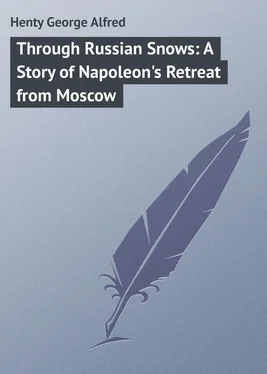George Henty - Through Russian Snows - A Story of Napoleon's Retreat from Moscow
Здесь есть возможность читать онлайн «George Henty - Through Russian Snows - A Story of Napoleon's Retreat from Moscow» — ознакомительный отрывок электронной книги совершенно бесплатно, а после прочтения отрывка купить полную версию. В некоторых случаях можно слушать аудио, скачать через торрент в формате fb2 и присутствует краткое содержание. Издательство: Иностранный паблик, Жанр: foreign_prose, foreign_children, на английском языке. Описание произведения, (предисловие) а так же отзывы посетителей доступны на портале библиотеки ЛибКат.
- Название:Through Russian Snows: A Story of Napoleon's Retreat from Moscow
- Автор:
- Издательство:Иностранный паблик
- Жанр:
- Год:неизвестен
- ISBN:нет данных
- Рейтинг книги:5 / 5. Голосов: 1
-
Избранное:Добавить в избранное
- Отзывы:
-
Ваша оценка:
- 100
- 1
- 2
- 3
- 4
- 5
Through Russian Snows: A Story of Napoleon's Retreat from Moscow: краткое содержание, описание и аннотация
Предлагаем к чтению аннотацию, описание, краткое содержание или предисловие (зависит от того, что написал сам автор книги «Through Russian Snows: A Story of Napoleon's Retreat from Moscow»). Если вы не нашли необходимую информацию о книге — напишите в комментариях, мы постараемся отыскать её.
Through Russian Snows: A Story of Napoleon's Retreat from Moscow — читать онлайн ознакомительный отрывок
Ниже представлен текст книги, разбитый по страницам. Система сохранения места последней прочитанной страницы, позволяет с удобством читать онлайн бесплатно книгу «Through Russian Snows: A Story of Napoleon's Retreat from Moscow», без необходимости каждый раз заново искать на чём Вы остановились. Поставьте закладку, и сможете в любой момент перейти на страницу, на которой закончили чтение.
Интервал:
Закладка:
"I warn you that I shall make my escape, and come back again as soon as I can," Julian said passionately.
"Well, sir, if you have a fancy for hanging, of course you can do so; but from what I hear, hanging it would be, as sure as you stand there. There is a warrant out against you, and the constables are scouring all the country."
"But what possible ground can they have to go upon except that smuggling affair?"
"Well, if what our friend told me is true, they have very good grounds, as they think, to go on. He was talking with one of the constables, and he told him that Faulkner is not dead yet, though he ain't expected to last till morning. His servants came out to look for him when the horse came back to the house without him. A man rode into Weymouth for the doctor, and another went to Colonel Chambers and Mr. Harrington. By the time they got there Faulkner was conscious, and they took his dying deposition. He said that he had had a row with you a short distance before he had got to his gate, and that you said you would be even with him. As he was riding up through the wood to his house, he suddenly heard a gun and at the same moment fell from his horse. A minute later you came out from the wood at the point where the shot had been fired. You had a gun in your hand. Feeling sure that your intention was to ascertain if he was done for, and to finish him off if you found that he was not, he shut his eyes and pretended to be dead. You stooped over him, and then made off at full speed. Now, sir, that will be awkward evidence to get over, and you must see that you will be a long way safer in France than you would in Weymouth."
Julian sank down, crushed by the blow. He saw that what the poacher said was true. What would his unsupported assertion go for as against the dying man's deposition? No doubt Faulkner had stated what he believed to be the truth, though he might not have given quite a fair account of what had taken place in the road; still, there would be no cross-examining him as to what had passed there, and his statement would stand unchallenged. As things now stood, Julian's own story that he had pursued a man over the hills, and had lost him, would, wholly unsupported as it was, be received with absolute incredulity. He had been at the spot certainly at the time. He had had words with Faulkner; he had had a gun in his hands; he had come out and leaned over the wounded man within less than a minute of the shot being fired. The chain of evidence against him seemed to be complete, and he sat appalled at the position in which he found himself.
"Look here, youngster," the poacher said, "it is a bad job, and I don't say it isn't. I am sorry for you, but I ain't so sorry as to go and give myself up and get hung in your place; but I'll tell you what I will do. When I get across to France I will draw up a statement and swear it before a magistrate, giving an account of the whole affair, and I will put it in a tin case and always carry it about with me. I will direct it to Colonel Chambers, and whenever anything happens to me it shall be sent to him. I am five-and-twenty years older than you are, and the life I lead ain't likely to give me old age. To make matters safer, I will have two copies made of my statement – one I will leave in the hands of one of our friends here. The craft I am in may be wrecked some day, or sunk by one of the cutters; anyhow, whichever way it comes, he is certain to hear of my death, and I shall tell him that when he hears of it he is to send that letter to Chambers."
"Thank you," Julian said earnestly. "It may not come for a long time, but it will be something for me to know that some day or other my name will be cleared of this horrible accusation; but I would rather have gone and faced it out now."
"It would be just suicide," the man said. "Weymouth ain't the only place in the world; and it is better for you to live out of it, and know you will get cleared some day, than to get hung, with only the consolation that perhaps twenty years hence they may find out they have made a mistake."
"It isn't so much myself I am thinking of as my brother and aunt. My going away and never sending them a word will be like confessing my guilt. It will ruin my brother's life, and kill my aunt."
"Well, I'll tell you what I will do," Markham said. "You shall write a letter to your brother, and tell him your story, except, of course, about this cave. You can say you followed me, and that I and some smugglers sprang on you and captured you, and have carried you across to France. All the rest you can tell just as it happened. I don't know as it will do me any harm. Your folks may believe it, but no one else is likely to do so. I don't mean to go back to Weymouth again, and if I did that letter would not be evidence that anyone would send me to trial on. Anyhow, I will risk that."
"Thank you, with all my heart," Julian said gratefully. "I shall not so much mind, if Frank and Aunt get my story. I know that they will believe it if no one else does, and they can move away from Weymouth to some place where it will not follow them. It won't be so hard for me to bear then, especially if some day the truth gets to be known. Only please direct your letters to 'Colonel Chambers, or the Chairman of the Weymouth magistrates,' because he is at least ten years older than you are, and might die long before you, and the letter might never be opened if directed only to him."
"Right you are, lad. I will see to that."
Just at this moment one of the sailors came down from the look-out above, and said that the signal had just been made from the offing, and that the lugger's boat would be below in a quarter of an hour. All prepared for departure; the lower door was unbolted, the lights extinguished, and they went down to the lower entrance. It was reached by a staircase cut in the chalk, and coming down into a long and narrow passage, at the further end of which was the opening Julian had seen from the sea. The party gathered at the entrance. In a few minutes a boat with muffled oars approached silently; a rope was lowered, a noose at its upper end being placed over a short iron bar projecting three or four inches from the chalk a foot or two inside the entrance.
The French captain went down first. Julian was told to follow. The sailors and Markham then descended. A sharp jerk shook the rope off the bar, and the boat then rowed out to the smuggler, which was lying half a mile from shore. As soon as they were on board the sails were sheeted home, and the craft began to steal quietly through the water, towing the boat behind it. The whole operation had been conducted in perfect silence. The men were accustomed to their work; there was no occasion for orders, and it was not until they were another mile out that a word was spoken.
"All has gone off well," the captain then said. "We got the laces and silks safely away, and the money has been paid for them. The revenue cutter started early this morning, and was off Lyme Regis this afternoon, so we shall have a clear run out. We will keep on the course we are laying till we are well beyond the race, and then make for the west. We have sent word for them to be on the look-out for us at the old place near Dartmouth to-morrow night, and if we are not there then, the night after; if there is danger, they are to send up a rocket from the hill inland."
The wind was but light, and keeping a smart look-out for British cruisers, and lowering their sails down once or twice when a suspicious sail was seen in the distance, they approached the rocky shore some two miles east of the entrance to the bay at ten o'clock on the second evening after starting. A lantern was raised twice above the bulwark, kept there for an instant, and then lowered.
"I expect it is all right," the captain said, "or they would have sent up a rocket before this. Half-past eight is the time arranged, and I think we are about off the landing place. Ah, yes, there is the signal!" he broke off as a light was shown for a moment close down to the water's edge. "Yes, there it is again! Lower the anchor gently; don't let it splash."
Читать дальшеИнтервал:
Закладка:
Похожие книги на «Through Russian Snows: A Story of Napoleon's Retreat from Moscow»
Представляем Вашему вниманию похожие книги на «Through Russian Snows: A Story of Napoleon's Retreat from Moscow» списком для выбора. Мы отобрали схожую по названию и смыслу литературу в надежде предоставить читателям больше вариантов отыскать новые, интересные, ещё непрочитанные произведения.
Обсуждение, отзывы о книге «Through Russian Snows: A Story of Napoleon's Retreat from Moscow» и просто собственные мнения читателей. Оставьте ваши комментарии, напишите, что Вы думаете о произведении, его смысле или главных героях. Укажите что конкретно понравилось, а что нет, и почему Вы так считаете.












